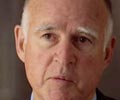Jerry Brown California attorney general

Even European countries signed on to Kyoto are not meeting the goals. This is not easy. Our wealth, our society is driven by oil and carbon. And when we say "we have to make a shift" - that is extremely difficult.
It's intellectually dishonest to somehow say we can get some light bulbs or get a Prius and when we're all done -- No. This is going to take massive technological innovation. It's going to take changes in the way we live and work. And it's going to take cooperation of unprecedented degrees among business and government and among countries. That's where we are. And that's why there's no other word except daunting.
I'm hopeful. I'm cautiously optimistic. But I would have to say one has to approach this with great humility. ...
Stephen Schneider Stanford University
 Read his full interview >
Read his full interview >
We've got a planetary catastrophe looming. This needs a deal. A deal needs leadership. Leadership needs trust. We're moving there much more rapidly than we have done for the last 30 years, but we've got to go fast. ...
Sunita Narain Center for Science and Environment, New Delhi

The Western model of growth is inherently toxic. I don't say this because I'm a mad environmentalist, I say this because of the simple fact that the Western industrial model which is highly capital-intensive and resource intensive uses a lot of energy and generates a lot of waste. Think back 40 years ago in the United States when you went through your economic growth -- you had problems similar to what we are dealing with today in India.
Now, how did you respond? You responded with huge investments in cleaner technologies and in regulatory systems -- but, you have never, never been able to deal with the problem. You keep investing and you keep finding newer and newer problems. ... So, the Western model essentially forces society to constantly innovate in technology, invest and still remain behind the problem.
There are people saying if India goes the same way, if China goes the same way on the same model of growth, we're sunk.
Oh, absolutely we're sunk. ... So, what I'm trying to tell my own country is, "Don't learn from the West's successes. Learn from their mistakes." Let's do it better. We can find leapfrog options. ...

It is India and other countries that make you a pessimist. Why?
Largely because of the population growth. When I go to Africa, India, or I look at Southeast Asia, I'm not optimistic from what I see in the policies going on. Yet that is where the population is going to be and that's where the major damage from climate change is going to take place -- in the tropics and in the Arctic and the Antarctic.
The fact is CO2 is an indicator of disbalance in the system.
It's a symptom.
Yes. And you have to cure the symptom. And the root cause is too many people first, too much population and an inability for the earth to support it in the way in which we do it now. ...
So it's not climate change, per se, in your view. It's general degradation of the environment.
It's a general degradation of the environment by human beings.
So how many people can the planet support?
In the way that we're doing it now, not as many as we have. I mean, nowhere near the 9 billion we're going to. And we probably had as much as the earth could handle at 4.
... We're already at 6.5 billion, so it's another 50 percent.
Half again more. And we probably should have half less in the way we use the earth. We're using the earth in ways that are appropriate to a population that's half the size it is now.
So do we fool ourselves by focusing so much on climate change and CO2 emisssions?
No. Because you need to have these indicators. You need to have something that attracts your attention. But it's gone beyond the indicator. ...
Eric Pooley Former managing editor, Fortune magazine

We're at a moment now in the U.S., as we see with the economic meltdown, of constrained economic choices. We're not going to be able to bet on everything. We're not going to be able to spend all the money that the nuclear industry wants us to spend on nukes, and all the money that the coal people want us to spend on coal, and all the money that solar, wind and hydro people want us to spend on those things. And I haven't even mentioned geothermal and some other very promising technologies.
So where do we make our bets? Where do we spend our dollars? That's what this debate is gonna be about. And one of the things that the market mechanism called cap-and-trade can do is make the market the placer of those bets. Put a price on carbon, make carbon expensive, and let the market let the investors decide. ...
Dr. Rajendra Pachauri Intergovernmental Panel on Climate Change
 Read his full interview >
Read his full interview >
What should individuals do, whether in China, India or the United States, Indonesia, Europe?
One of the things we've highlighted in our report this time is the immense importance of lifestyle changes and consumption patterns. We have to create a consciousness starting at the level of schoolchildren of how our actions are really impacting on the planet.
...I don't believe that human nature is not capable of making some major changes, but there has to be a driving force that takes us in the right direction. …
What is the biggest hurdle that you face?
Ignorance and inertia.
People are living in a state of blissful ignorance. They don't know how technologies, opportunities and the problems that are facing us are changing rapidly.
And inertia, which is in some sense a function of vested interests. Everybody is benefiting from continuing with the existing system. A shift will produce some winners and some losers. Therefore, the potential losers are going to do everything to block change. They have deep pockets, know how to influence the system.
That's why I believe you need to inform the public. People are basically rational. Once they see through the game and realize that whatever is being pursued is against their basic interests, I think there's some hope for change. ...
Michael Bloomberg Mayor, New York City
 Read his full interview >
Read his full interview >
You've got to focus on what is actionable. We are not going to stop airplanes from flying. We are not going to stop generating power from coal. We are not going to stop having air conditioning blasting in the summer. We've crossed that bridge.
What we can do, however, is start down the path of building nuclear, wind, more hydro kinds of power generation, and funding scientific projects that will work on the problem of how do you sequester CO2. There's no easy answer to that, at least none we've discovered yet. But to wait for that is ridiculous.
We can do the smaller stuff. We can work on ships that generate an enormous amount of pollution. It really would not raise freight rates very much to have the big ships at sea stop polluting.
You can argue that the things that I'm suggesting are the low-hanging fruit. But, you know, there's always going to be low-hanging fruit. If you take the low-hanging fruit now, there's just another low-hanging fruit right above it. And you want to work your way up. And as technology and science gets better, some of the fruit starts hanging lower, where before it was out of reach. ...
T. Boone Pickens President, BP Capital
 Read his full interview >
Read his full interview >
You said on CNBC, when you were interviewed, that somebody's got to stand up and do something about climate change, energy, because this is huge.
I think it's the biggest thing that I've ever seen in my life. It's now unfolding in front of us. And the first place that should get everybody's attention is you're having this huge movement of wealth away from one area to another area. And you better figure out how you stop that. And that then brings you in to energy developed in this country. And then you start saying, you know, where is it? What can we do? And there's a lot of things we can do. But we haven't focused on them.
So what you're saying is that for a whole lot of reasons ... we've gotta get on with figuring out new energy - even putting climate change aside.
The climate change fits into it - they all work together. ... All these things are going to work. You aren't going to have any source of energy that isn't gonna get a chance. And they're probably all going to work. I say "probably." You have some that are too expensive at this point. But they're getting in range all the time.
That's quite a big statement. You're saying that we're going to change our whole energy infrastructure in the next 50-100 years?
Yes. Definitely in 50 years. It will. I won't see it. You won't either.
Does the average citizen understand what's coming?
No, they don't want to think out that far. But this is getting very short term. As the price of gasoline goes up and you hit $4 a gallon, things get pretty dicey. ...
Mindy Lubber Shareholder advocate
 Read her full interview >
Read her full interview >
If, in fact, it's only environmentalists who are concerned about solving the climate change catastrophe that's looming, we won't win. The business community has got to be part of it.
The business community is further along than the policy makers in Washington, because we're hearing a chorus of business leaders saying, "We need mandatory controls," and Washington has yet to act.
This issue has made it to Wall Street, although Wall Street isn't fully acting. It has made it to the analyst community. Corporate board members have finally seen they've got an obligation to build it into the strategic plan of their companies. ...
Vinod Khosla Founder, Sun Microsystems
 Read his full interview >
Read his full interview >
...The primary change, people, boils down to only five or six issues. We need to replace oil. We'll replace it broadly only when we have a cheaper alternative, and I think that's very likely.
We need to replace coal with cleaner, cheaper alternatives. And replace building materials like cement and steel; and the internal combustion engine and lighting.
If we did those six things, we are 80, 90 percent of the way to eliminating carbon.
This is not a complex problem by definition, but doing these things is hard. The technology to replace the internal combustion engine is hard. I suspect we'll cut its emissions in half over the next five to 10 years if we have the right incentives.
So having a price for carbon is a wonderful idea. And the higher the price, the faster we will go to these alternatives.
And we need scalable solutions. So my only beef -- and I could agree with all the goals of the environmental organizations -- is let's not push the stuff that won't scale enough to make the difference.
I don't know how much time we have. Is it 10 years, 20, 50 before we reach that tipping point where climate change becomes irreversible? Nobody can know. There's clearly a probability distribution. We need to insure this planet, and we need to do it quickly. And that means highly scalable solutions that make economic sense. ...
Jeroen Van Der Veer CEO, Royal Dutch Shell
 Read his full interview >
Read his full interview >
You've said that there are three hard truths that we need to face about the oil business. What are they?
First of all, the world continues to increase in amount, population growth, welfare growth. So we are very sure that the world will demand more energy.
Secondly, so far renewables are too expensive for the consumer. ... And then realize that because the demand will go [to] what is lowest cost, that's oil and gas and coal, and that leads to the CO2 problem. And that's a very serious problem. ...
And the third one, even if you would correct the CO2 problem, we have to realize that the access and opportunities for easy oil, easy gas -- you'll run out of those opportunities. So that means a lot of the additional oil and gas has to come out of sensitive areas -- think about the Arctic. ...
Joseph Romm Author, Hell and High Water

Fundamentally, we have about 10 years to reverse course. If we stay on our current path for 10 years, it will be all but impossible to avoid what I consider to be catastrophic global warming.
Most of the calculations are that the world needs to have 50 percent or lower emissions by 2050 than currently. Emissions are going to have to peak around 2020 or 2025. And that isn't easy to do. Coal plants last 30 to 50 years. Cars now last 20 years.
So if you don't start now, you build another generation of polluting and inefficient infrastructure that makes it impossible to solve the problem. Or at least would force you to then go back and shut down that infrastructure which would be incredibly expensive. It's obviously much worse to build stuff that you then have to dismantle than to not build it at all.
We need to average [five billion metric tons of carbon] for the century -- maybe less -- and we're at eight and rising three percent a year. The concentrations of carbon dioxide which are the big problem in the last ten years have been going up about two parts per million. We're now at 380 parts per million. Pre-Industrial Age, we were 280 parts per million of carbon dioxide. If we get past 450, we may cross over to tipping points you can't cross back from. …
We've seen in the last 10 years an acceleration of emissions and concentrations. If we can reverse course in the next few years I think there is a chance of avoiding the worst. But I don't think there's any question that if China keeps building its power plants the way it's doing, and the U.S. keeps doing nothing but continuing to grow emissions about one percent a year then it will be incredibly difficult, in 10 years, to undo what we've done.
And this is man-made. The problem is anthropogenic emissions.
There's no question that climate has varied in the past for natural reasons. But not for random reasons. That's the distinction.
When it has warmed in the past, it's because the earth's orbit has changed which made the northern hemisphere warmer in the summer, which led to more melting of the ice, which led to replacing reflective ice with the water or dark land which created a feedback. You'd heat up the water. More melting. And you'd create a sort of a runaway effect there.
And then you would emit more carbon from various places, like the tundra. So you have had past warming events triggered by changes in the earth's orbit. And inclination current warming is being forced by human emissions of greenhouse gasses. Heat trapping gasses, like carbon dioxide and methane, have just accelerated wildly in the last century.
In particular, in the last six or seven years, the rate of growth of carbon dioxide emissions has tripled. It was about one percent per year. Now it's about three percent per year. And a lot of that is the U.S.'s refusal to take action on global warming. A lot of it is China building coal plants at a rapacious rate. …
Is [there] something that's disconnect[ed] between the situation[s] you have described -- and the urgency that you are describing -- and [the] understanding in boardrooms and in Congress?
I think there's no question about that. … I think the people who are the most alarmed about global warming are people who understand both the science and the reality of the energy system in the world. …
We're going to see three billion more people. Not only that, we're going to see a rapid growth in the middle class in the developing world, to a point where they want cars and computers. So that the reality of energy technology and energy markets means that the energy system of the planet is like a train.
You can't move the train off the current path unless you build new tracks. You have this locomotive -- [a] coal fired locomotive -- accelerating towards the precipice at great speed. It would be very, very difficult to slow it down. It would be impossible to change direction unless you build new tracks.
So this is the greatest challenge that humanity faces. It is unusual in the history of humanity for us to know what our biggest threat is before it's actually occurred. That doesn't happen that often. ...
Most people don't get the scale of the solution.You have to really look at the solution side of things very hard to realize just how much effort it's going to take. ...
Jeff Goodell Author, Big Coal
 Read his full interview >
Read his full interview >
... I'm not suggesting that we have to go back to living in caves. But I think that solving this problem means more than just switching out coal for something else. It means changing the way we think about energy, and changing the way we consume our energy and realizing that energy is going to be more expensive, but that we can use less of it and get the same value. ...
But what I'm hearing you say is that we don't necessarily have to sacrifice in our living standard in order to accomplish this?
Well, it depends on what you consider sacrificing our living standard. If you live in a 15,000-square-foot McMansion that is heated to 80 degrees in the winter and cooled to 50 degrees in the summer, you may find that that's an unsustainable way of life in a future where there's higher energy prices and energy becomes a scarcer commodity. So if that's what you mean by changing our lives, I think that kind of thing will have to change.
But isn't that what we're all driving toward in one way or another? ... More comfort, more convenience, more modern appliances.
Yes, I think so. And I'm a big believer in social progress and technological progress, so I think the iPod is a big improvement over the CD, you know? But I don't think that that necessarily equates with more energy consumption and more continuing on in the same way.
[T]he era of cheap energy is over, and it is going to become more expensive, so we're going to have to become smarter about how we consume it. ...
Rafe Pomerance Founder and chairman, Climate Policy Center

We're out of time. The question is how much happens before we get a handle on this -- different thresholds will be crossed as we go forward.
And what you don't want to happen is the worst possibilities taking place. like massive amounts of methane being fluxed out of the high latitude regions of the northern hemisphere. In the peat. In the soils of the artic. In the boreal forests, there's a massive amount of carbon that could be vented as carbon dioxide or methane. And that could be an uncontrollable release.
So the thing could get out of control. And you don't want the ice sheets to start to lose mass at a very fast rate.
So this is the Siberian permafrost melting--
Yes. Or a lot of methane in the hydrates in the ice in the artic ocean that could be vented. So we don't know if this will happen. But once it goes, it becomes very difficult to stop.
Last week at Harvard, 40 or 50 climatologists gathered to talk about geoengineering. The reason they're talking about dumping particles into the stratosphere to block sunlight, to cool off the earth, is their fear that we won't get there in time. That's why the geoengineering debate has come back -- it's the fear that the thing is moving too fast.
... Does Congress get this?
No. The United States government as a whole doesn't get this yet. We have to mobilize ourselves to the scale of this issue. You have to engage the whole world successfully. So it's a challenge without precedent.
We've experienced in the last three months the loss of thick sea ice on a massive scale no one predicted
For every ton of CO2 emitted in the atmosphere, more of it is now staying there. So in effect the pollution control system of the earth is weakening. Can't absorb all of the CO2 we're putting up.
The third thing that happened is that CO2 itself, the emissions are rising faster than anyone expected it. And fourth, the sea level rise estimates for this next century have gone up. Are going up as well.
Help me understand this. So the IPCC [Intergovernmental Panel on Climate Change] research is outdated?
Well, I think that the scientists were unable to be conclusive about what the impacts of warming would be in the relatively early period of warming that we're in now.
One thing that's occurred in a huge way in the 1980s and '90s is coral bleaching. We've lost a massive amount of coral in the world because the oceans are now too hot. Coral can only survive right up to the edge, you know, very modest temperature variability.
And when it gets too hot, the corals bleach. And if the bleaching goes on too long, they die. So, this is a massive loss of biodiversity in the world. And it's already happening. Nobody predicted it. Because climate models weren't terribly tuned to sensitive biological systems. And the marine biologists didn't predict this either. They observed it after the fact.
Second example is now really apparent in the Arctic where a million square kilometers of sea ice disappeared, unexpectedly. In other words, sea ice had been tracking downward over the last 30 years. But this year, it fell of the cliff.
There were scientists on their way to put instruments on the pack ice, or the sea ice. And they got there, and it wasn't there. These are people who are expert. Well, the models, again, which try to forecast what's going to happen to sea ice didn't predict this.
We're losing the refrigerator of the Northern Hemisphere, that keeps us cool. We're losing it a lot faster. People are predicting the loss of all summer sea ice next decade. This was not talked about, you know, three years ago, even.
This is something we thought would happen, 2080, 2100?
Yeah that was the idea. All the economists and even the modelers thought that we had time to act. Because if you could stabilize concentrations at 75 percent or 100 percent of pre-industrial levels, that represented some sort of stability in the system. Well, I'm afraid that doesn't work. We may see many of the thresholds that were thought to be associated with doubling of CO2 coming much earlier, big ones.
Sea ice loss, Greenland is losing mass down there. Remember, we don't know how fast Greenland will shrink. It's started to shrink now. But Greenland has seven meters of sea level rise in it. And it's melted before. It's shrunk before.
Seven meters everywhere?
Globally. Everywhere. Everywhere on earth. There's that much ice and snow on Greenland. Well, it's shrinking now. Now, "well, it'll take a long time, a thousand years." Will it? We don't know. 300 years? We don't know.
Because nobody understands the processes and dynamics of what's going on on Greenland right now. They don't understand, as they didn't understand what was going to happen to the sea ice, as they didn't understand what was going to happen to the coral reefs.
So, the notion that we have time, I think, has been buried. We are now thinking we are catching up to this issue -- it's way ahead of us. ...